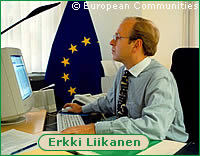Commission adopts recommendation for new electronic communications framework
In an effort to harmonise diverging national approaches, the European Commission adopted a final recommendation for a new regulatory framework on electronic communication networks and services on 11 February. The new framework outlines the rules that network operators and service providers need to follow when dealing with other operators, providers and customers. National regulatory authorities will be responsible for implementing the framework which is scheduled to come into force from July 2003. 'The message that we want to send to the market today [...] is our desire to begin the process of reducing regulation and to promote and secure investment in networks and technologies at a time of economic uncertainty,' said Commissioner for Enterprise and Information Society Erkki Liikanen. He added that the framework represents 'a new departure in regulation of electronic communications: we cannot continue to think in the traditional way of each network having its own set of rules.' The latest recommendation pinpoints 18 markets in the electronic communications sector where regulation may be justified. In parallel, the recommendation also seeks to roll back regulation where it is no longer required. National regulators are expected to use the list of markets to make their own market analyses. However, the recommendation stipulates that, if national; regulators wish to intervene in markets that are not on the list, they must first seek approval from the Commission. According to Mr Liikanen such a 'regulatory approach will ensure that rules evolve as technology and markets change, so that redundant regulation is removed.' Mr Liikanen particularly emphasised the benefits of the new framework in creating a more stable and predictable regulatory environment. 'New entrants need to know when they draw up their business plans that the rules of the game are not going to change overnight: they need legal certainty and stability,' he said. 'Regulatory authorities have also the flexibility to address the specific situations in different countries and can, with the Commission's agreement, adjust or amend the pre-identified markets,' added Mr Liikanen. The Commissioner also noted that innovation was often a by-product of a competitive market. Removing regulation where possible would allow 'normal market forces to work freely' as well as ensuring incentives for companies to invest in new infrastructures. 'Firms that take risks in making new investments deserve to be able to profit from those investments,' argued Mr Liikanen. On the same day, a seminar was opened by Mr Liikanen at the European Parliament on the potential benefits of digital TV for European society and economy. Among the many instruments used by the Commission, Mr Liikanen highlighted the significant work of the new regulatory framework in the area of promoting the development of digital TV networks. Mr Liikanen reiterated the steps taken by the European Commission and Parliament to ensure a standard for digital TV in Europe such as: the introduction of Article 18 of the regulatory framework directive, which calls on Member States to monitor open standards and interoperability from July 2004 and the publication of a consultation document on interactive television interoperability at the end of 2003. The Commissioner concluded by calling on industry to take the necessary actions in order to help define platform standards and achieve interoperability in digital TV. 'The successful roll-out of interactive television could contribute to achieving an important policy objective, by delivering information society services to television screens.'



